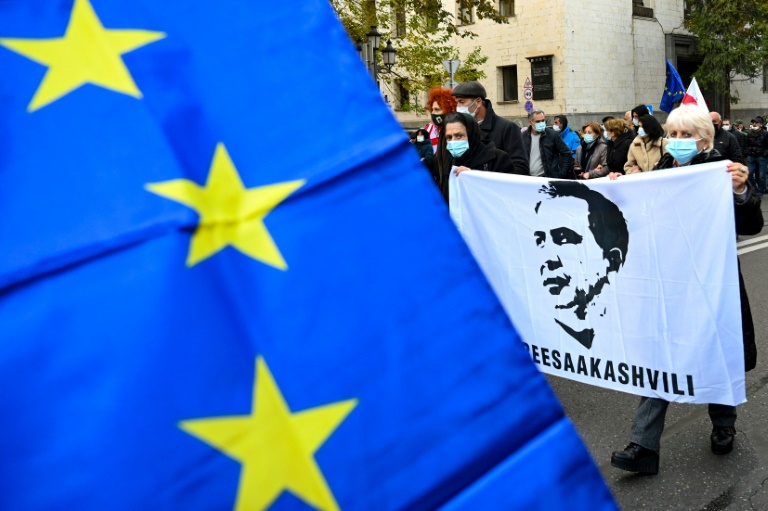Georgia’s government said Friday it was open to moving ex-leader Mikheil Saakashvili, who has been on hunger strike for 50 days, to a military hospital after doctors warned he risked death in his current prison clinic.
Thousands of Saakashvili supporters took to the streets Friday evening, demanding Saakashvili be guaranteed proper medical care.
The government’s announcement came after Saakashvili, 53, fainted and doctors urged authorities to move him to a regular clinic, saying his life was in danger.
The flamboyant pro-Western reformer launched a hunger strike after being imprisoned upon his return from exile in Ukraine on October 1, saying his arrest was political.
Georgian authorities had initially rejected the medical recommendations, but Justice Minister Rati Bregadze said Friday they were open to moving Saakashvili.
“Our proposal is to move him to a military hospital” in the city of Gori, some 90 kilometres (55 miles) west of the capital Tbilisi, Bregadze said at a press conference.
“This is a place where his health and security will be protected at most by the state,” Bregadze added.
Waving Georgian and European Union flags, several thousand Saakashvili supporters rallied Friday evening outside parliament in Tbilisi.
Nika Melia, the chairman of Saakashvili’s United National Movement party (UNM) — Georgia’s main opposition force — said the “rally will not disperse until Saakashvili is moved to an appropriate clinic.”
– ‘Risk of fatal complications’ –
On Thursday, Saakashvili fainted and was moved to an intensive care ward in the prison hospital.
Doctor Giorgi Grigolia, who had seen Saakashvili on Thursday, told AFP that his condition was “life threatening” and that “he must be moved to a civilian clinic without delay.”
He cited a number of neurological and heart conditions that “could become irreversible, fatal without a proper care, which is impossible in the medical facility where he is currently being treated.”
Grigolia is part of a council of medics set up by ombudsperson Nino Lomjaria.
On Wednesday, the council said Saakashvili’s “current status is assessed as critical” and that he faced a risk of fatal complications in the “immediate future.”
The prison hospital where Saakashvili is being treated fails to meet his medical needs, it added, calling for his immediate transfer to a civilian clinic.
A spokesman of the United States Department of State, Ned Price, on Thursday night urged Georgian authorities to heed the recommendation and “treat Mr. Saakashvili fairly and with dignity.”
The European Court of Human Rights ruled last week that Georgia must ensure Saakashvili’s “safety in prison, and to provide him with appropriate medical care for the post-hunger-strike recovery period.”
Saakashvili said last week he had taken a decision to end the hunger strike if he was transferred to a “high-tech clinic for post-hunger strike rehabilitation”.
– ‘Denied proper care’ –
Saakashvili’s lawyer Dito Sadzaglishvili said — prior to the justice minister’s announcement — that the country’s prison service was “guided by political motives, rather than medical considerations”.
“Despite repeated calls by doctors, the government is denying Saakashvili his right to proper medical care,” Sadzaglishvili told AFP.
Saakashvili was moved last week to a prison hospital where, Amnesty International said, he had been “denied dignity” as well as adequate care.
The rights group on Twitter described it as “selective justice” and “apparent political revenge.”
Saakashvili has said he was assaulted by prison guards and that he fears for his life.
Georgia’s president from 2004-2013, he left the country after his second and last term expired and had since lived in exile in Ukraine, where he headed a government agency steering reforms.
Saakashvili’s arrest after his return to Georgia has deepened a political crisis that erupted after parliamentary polls last year that the opposition denounced as fraudulent.
It has also spurred some of the largest anti-government protests in a decade.
Prime Minister Irakli Garibashvili sparked an uproar recently by saying Saakashvili “has the right to commit suicide” and that the government had been forced to arrest him because he had refused to quit politics.










